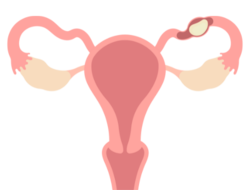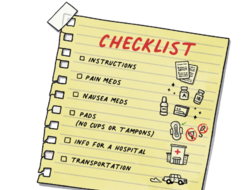This is where you’ll find information on human reproduction – how it really happens and works and how it really doesn’t – pregnancy options, including comprehensive abortion information, pre-natal, pregnancy, labor, birth, post-partum and pregnancy loss resources, healthcare options, and help with pregnancy scares.
Pregnancy

Highlighted content
Articles and Advice in this area:
- Heather Corinna
The short answer is… when she’s okay with or wants a pregnancy or a sexually transmitted infection. Here’s the longer answer, since it’s a bit more complicated than that. To get you up-to-speed with the basic facts, when it comes to pregnancy, of every 100 women who have vaginal intercourse…
- Heather Corinna
Unless her doctor was on drugs, wasn’t really a doctor, or was a complete lunatic, there is no way he or she would have said any such thing. Pregnancy cannot just magically appear, end and reappear all by itself. That could only happen in, say, the same world where that guy in the Santa suit at a…
- Heather Corinna
If you took your pregnancy tests two weeks after your last risk, you can feel pretty confident in the negative results you got. If you did not wait that long, you’ll want to retest when it has been two weeks since your last risk. It would be early to have pregnancy symptoms already from a risk two…
- Stephanie
It’s not likely for a person to be pregnant and still menstruate – especially past very early pregnancy – though some people will experience some vaginal bleeding (which is not the same as menstruation, or a period) during pregnancy. Part of the problem is that many people term any vaginal…
- Heather Corinna
There are a few possibilities. • Maybe she is on the pill, but either doesn’t know how to use it properly, or hasn’t been using it properly, such as by missing pills, confusing active pills for placebos, or had an interaction with her pill and another medication, like an antibiotic. • Maybe you’re…
- Sarah Riley
Without some help…no. In order for a pregnancy to occur, the first thing you need is a sperm and an egg. Individuals who have ovaries are going to be able to provide the ovum (or egg) while individuals who have testes are going to provide the sperm. So if you have two individuals who have ovaries…
- Sarah Riley
Choosing a pregnancy test can be pretty overwhelming. This article is designed to give you a general overview of pregnancy tests. It will discuss what a pregnancy test does, the difference between a urine test and a blood test, how to choose a pregnancy test, when and how to use pregnancy tests, and finally what to do after a pregnancy test.
- Sarah Riley
Well, panic doesn’t really do anybody any good, so I’d advise not spending your time in a panic period. However, based on what you described you do have both a pregnancy risk and an STI risk. Withdrawal (or “pulling out”) is not really a good method of birth control. (Our own founder, Heather, is…
- Susie Tang
The difference is that PMS symptoms won’t cause your pregnancy test to turn positive. Using symptoms to determine if you’re pregnant is really unreliable. If you absolutely must know if you’re pregnant, wait 10 to 14 days after the sexual encounter in question then take a pregnancy test using the…
- Heather Corinna
Understand that if a person with a penis is aroused and/or erect, then there is likely some pre-ejaculate at some point. If his penis is visible, you will likely be able to see it, but for obvious reasons, if it’s inside your vagina or your mouth, you’re not going to be able to see it, and both you…



